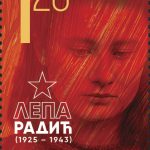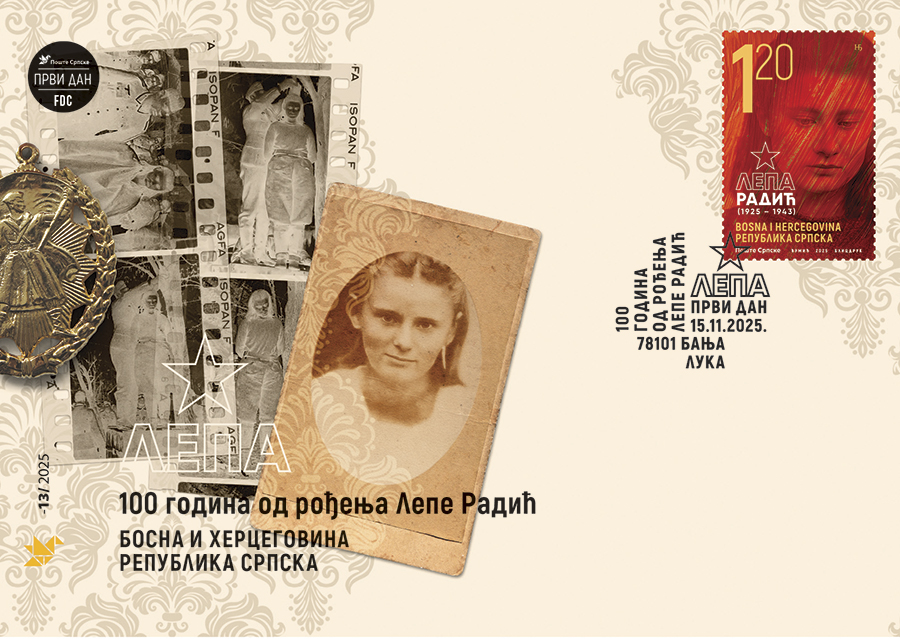100 Years since the Birth of Lepa Radic
Title:100 Years since the Birth of Lepa Radic
Date of Issue: 15.11.2025.
Author: Nebojsa Djumic
Type edition: commemorative
Printing techniques: multicolour offset
Sheet: 9
Paper: muflep 100g
Printing House: Blicdruk, Sarajevo
 Motive: Lepa Radic
Motive: Lepa Radic
Catalogue no.: 1014
Perforation: 13 3/4
Face value: 1.20 BAM
Quantity: 8 000

100 Years since the Birth of Lepa Radic
The bandit girl, hanged in Bosanska Krupa, showed unprecedented defiance” - these are the words used in the official execution report of 1943 to describe the hanging of the captured 17-year-old girl, partisan and national hero - Lepa Radic. Lepa was born in 1925 in the village of Gasnica near Gradiska, into a family that fostered patriotism and honesty. Even as a child, she showed exceptional courage and a strong sense of justice. Her love for books, but also for the left-wing movement and the ideas of justice, equality and brotherhood, was instilled in her by her uncle Vladeta, who regularly brought progressive literature from Banja Luka to his niece.
Having escaped from an Ustasha prison in December 1941, she worked as a nurse for several months, joined the partisans and became actively involved in the anti-fascist struggle at the age of 15. Her father Svetozar, 15-year-old brother Milan and uncle Vlado were killed in the Kozara offensive. As a member of the Headquarters for the Evacuation of the Wounded and the Population from Threatened Areas, Lepa was among the most prominent organizers of the escapes in January 1943. She led a group of 150 women, elderly people and children to the nearby Grmec. In the evening, on February 8, 1943, members of the 369th “Devil’s” Division suddenly surrounded and captured them. When the women from the escapees urged her to throw down her weapons and save herself, she refused, calling on the people not to surrender. She fought heroically until the last bullet, grappling with the Germans, trying to protect her people who were mercilessly abused on the road to Bosanska Krupa, "Kill me, the people are not guilty" - Lepa shouted, stumbling under the blows of the rifle butt. After three days of abuse, refusing to reveal who else of the partisan collaborators were among the people, she was taken to the gallows. Her hands were tied with a telephone cable, without shoes, only in woolen socks, exhausted and tired, but proud and defiant. "Fight, people, for your freedom, do not give yourself into the hands of the villains! Let them kill me, there will be someone to avenge me" - she exclaimed before her death.
Lepa's courage, devotion to ideals, and love for her homeland are remembered as a symbol of resistance and sacrifice. In 1951, she was posthumously proclaimed a national hero of Yugoslavia – the youngest in history. Her character and work remain an eternal inspiration for generations to come.
Author: Nebojsa Djumic
Publisher: Poste Srpske a.d. Banjaluka



